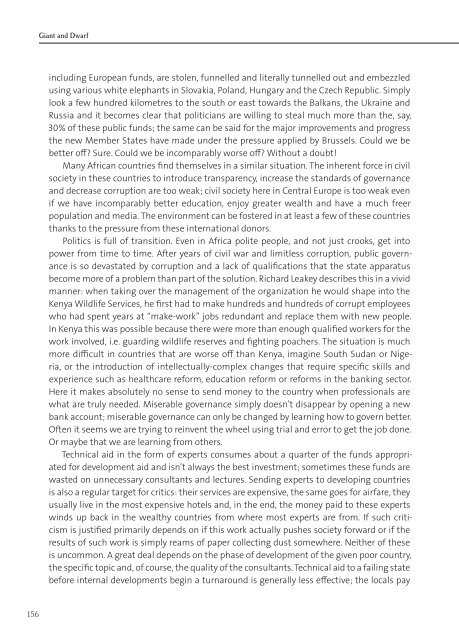Giant_and_Dwarf-FIN
Giant_and_Dwarf-FIN
Giant_and_Dwarf-FIN
Create successful ePaper yourself
Turn your PDF publications into a flip-book with our unique Google optimized e-Paper software.
<strong>Giant</strong> <strong>and</strong> <strong>Dwarf</strong>including European funds, are stolen, funnelled <strong>and</strong> literally tunnelled out <strong>and</strong> embezzledusing various white elephants in Slovakia, Pol<strong>and</strong>, Hungary <strong>and</strong> the Czech Republic. Simplylook a few hundred kilometres to the south or east towards the Balkans, the Ukraine <strong>and</strong>Russia <strong>and</strong> it becomes clear that politicians are willing to steal much more than the, say,30 % of these public funds; the same can be said for the major improvements <strong>and</strong> progressthe new Member States have made under the pressure applied by Brussels. Could we bebetter off? Sure. Could we be incomparably worse off? Without a doubt!Many African countries find themselves in a similar situation. The inherent force in civilsociety in these countries to introduce transparency, increase the st<strong>and</strong>ards of governance<strong>and</strong> decrease corruption are too weak; civil society here in Central Europe is too weak evenif we have incomparably better education, enjoy greater wealth <strong>and</strong> have a much freerpopulation <strong>and</strong> media. The environment can be fostered in at least a few of these countriesthanks to the pressure from these international donors.Politics is full of transition. Even in Africa polite people, <strong>and</strong> not just crooks, get intopower from time to time. After years of civil war <strong>and</strong> limitless corruption, public governanceis so devastated by corruption <strong>and</strong> a lack of qualifications that the state apparatusbecome more of a problem than part of the solution. Richard Leakey describes this in a vividmanner: when taking over the management of the organization he would shape into theKenya Wildlife Services, he first had to make hundreds <strong>and</strong> hundreds of corrupt employeeswho had spent years at “make-work” jobs redundant <strong>and</strong> replace them with new people.In Kenya this was possible because there were more than enough qualified workers for thework involved, i.e. guarding wildlife reserves <strong>and</strong> fighting poachers. The situation is muchmore difficult in countries that are worse off than Kenya, imagine South Sudan or Nigeria,or the introduction of intellectually-complex changes that require specific skills <strong>and</strong>experience such as healthcare reform, education reform or reforms in the banking sector.Here it makes absolutely no sense to send money to the country when professionals arewhat are truly needed. Miserable governance simply doesn’t disappear by opening a newbank account; miserable governance can only be changed by learning how to govern better.Often it seems we are trying to reinvent the wheel using trial <strong>and</strong> error to get the job done.Or maybe that we are learning from others.Technical aid in the form of experts consumes about a quarter of the funds appropriatedfor development aid <strong>and</strong> isn’t always the best investment; sometimes these funds arewasted on unnecessary consultants <strong>and</strong> lectures. Sending experts to developing countriesis also a regular target for critics: their services are expensive, the same goes for airfare, theyusually live in the most expensive hotels <strong>and</strong>, in the end, the money paid to these expertswinds up back in the wealthy countries from where most experts are from. If such criticismis justified primarily depends on if this work actually pushes society forward or if theresults of such work is simply reams of paper collecting dust somewhere. Neither of theseis uncommon. A great deal depends on the phase of development of the given poor country,the specific topic <strong>and</strong>, of course, the quality of the consultants. Technical aid to a failing statebefore internal developments begin a turnaround is generally less effective; the locals pay156


